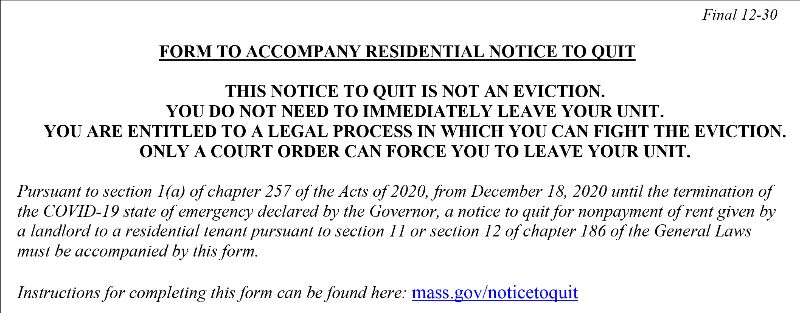New COVID Landlord, Court Regulations Now Law (FY21 Budget, 191-H5181, Ch. 257 of the Acts of 2020)
| . Posted in News - 0 Comments
By Eric Weld and Peter Vickery, MassLandlords, Inc.
Note: the Chapter 257 law has been extended from Jan. 1, 2023, to March 1, 2023, by the April 1, 2022, budget amendment. This delays court cases while an application for rental assistance is pending.
A new law, signed by Gov. Charlie Baker on December 31, 2020, introduces important new regulations affecting Notices to Quit (NTQs) served for rent nonpayment, and eviction filings.

Chapter 257 of the Acts of 2020 requires any Notice to Quit delivered for nonpayment to be accompanied by an attestation form that includes a note, all in caps, informing tenants of their rights. Image: Public domain, Mass.gov.
The regulations in Chapter 257 of the Acts of 2020 (signed into law as House bill, 191 H.5181), An Act providing for eviction protections during the COVID-19 pandemic emergency, will remain in effect for the duration of the State of Emergency signed by Gov. Baker on March 10, 2020, or until the law is repealed.
Section 1 of the law requires that any new NTQ served to a tenant for nonpayment of rent also include a downloadable form, developed by the Executive Office of Housing and Economic Development (EOHED), providing details related to the coronavirus pandemic’s impact on the tenancy, as well as a verbatim statement explaining the legal ramifications of the notice. The law also requires NTQs to be electronically copied to the EOHED.
Section 2 of the law directs courts to grant delays in any nonpayment eviction cases resulting from the COVID pandemic and economic response if tenants have applications pending for emergency rental assistance.
Sections 3 and 4 implement reporting and monitoring of the Eviction Diversion Initiative, a $171 million package of resources to provide housing support for renters and landlords impacted by the pandemic and response.
We take a more detailed look at Chapter 257 below.
Bill Numbering Clarification: Circuitous road to ratification
Readers following Massachusetts politics will likely know Chapter 257 of the Acts of 2020 by another name. The provisions of Chapter 257 of the Acts of 2020 were originally included as Outside Sections 79, 80, 88, and 103 in the fiscal year 2021 state budget, which the governor signed on December 11, 2020. Sections 79 and 80 were originally vetoed by the governor and sent back to the legislature for proposed amendments.
Specifically, Governor Baker had proposed removing a provision in Outside Section 79 that would have required the courts to reject any summary process cases filed without proof that an NTQ had been delivered to the tenant. The governor argued that such required proof would unnecessarily and inappropriately place judicial responsibility on court clerks, who are the first to receive and begin processing eviction case filings.
Chapter 257 retains the requirement as originally written. Sections 1 and 2 of Chapter 257 mirror Outside Sections 79 and 80, respectively, of the state budget. Chapter 257 also duplicates Outside Sections 88 and 103.
New Notice to Quit Process
Chapter 257 of the Acts of 2020 mandates that any NTQ served for rent nonpayment must also be sent electronically to the EOHED, using an online submission form and uploading NTQ documents that have been served to tenants, in one of several formats. This regulation assures that any personal identifying information will be kept confidential, with a caveat: that the EOHED may share the information with individuals named on the NTQ, the landlord, and, “to the extent permitted under federal law,” a regional administering agency or housing consumer education center, “for the purposes of providing housing stability resources to tenants at risk of eviction.”
The law also requires any NTQ served for rent nonpayment to include an attestation form – downloadable from the EOHED Notice to Quit webpage – comprising several sections: 1.) a statement attesting that the tenant has provided a declaration, under the Centers for Disease Control and Prevention (CDC) eviction moratorium, that their ability to pay rent has been detrimentally affected by the COVID pandemic and response; 2.) a statement attesting as to whether the rental is a “covered” property as described in the CARES Act, and the NTQ is in compliance with that law; 3.) any agreements struck between landlord and tenant for the tenant to repay unpaid rent; and 4.) information about rental assistance programs, such as RAFT and ERMA, trial court rules and orders pertaining to summary process actions, and any federal or state restrictions on residential evictions.
In addition, the attestation form includes, in bold, all-capital print, at the top, the following statement:
“This Notice to Quit is not an eviction. You do not need to immediately leave your unit. You are entitled to a legal proceeding in which you can defend against the eviction. Only a court order can force to you leave your unit.”
The EOHED NTQ page provides detailed instructions for landlords about the required form.
Are there workarounds?
What if the landlord wishes to avoid the paperwork of a nonpayment case and serves a no-cause NTQ instead? If the summary process summons and complaint asks for rent/use and occupancy, the court will treat it as a nonpayment case. Serving a no-cause NTQ and then seeking rent via summary process will not work. There are no end runs.
RAFT Eviction Moratorium: No Judgments and No Executions
Section 2 in the new law will also affect landlords with pre-existing or newly filed nonpayment cases.
For newly filed nonpayment cases, Section 2 directs courts to grant a continuance “for a period as the court may deem just and reasonable,” in any summary process cases in which: 1.) the tenancy is being terminated for rent nonpayment; 2.) rent nonpayment was due to COVID financial impact; and 3.) the tenant can demonstrate that they have a pending application for emergency rental assistance, to RAFT, ERMA or another program. Counterclaims may be considered by courts pertaining to this section, pending decisions from RAFT and ERMA.
For pre-existing nonpayment cases, the courts are prohibited from entering judgments or issuing executions where the tenant has a pending application for rental assistance.
What if the parties are having a mediation or a hearing and the tenant still has not applied for rental assistance? If the tenant applies during the court event itself, that is sufficient; the court will continue the case.
What if the tenant applies for RAFT and the application is denied? Can the tenant then apply for another form of rental assistance and require another continuance until that second application is either approved or denied? That is not clear yet, but the answer is “probably.”
Weekly trial court data reports
As part of Chapter 257, Section 2, the courts are directed to provide monthly reports giving data about eviction cases.
The reports, the law says, will include: 1.) the number of summary process cases filed with each court; 2.) the number of default judgments entered; 3.) the number of execution for possession orders granted; 4.) the number of continuances requested and granted due to pending rental assistance applications (see above); 5.) the number of stays issued; 6.) the average length of stays and continuances granted; 7.) the number of stays requested, granted or denied through Chapter 239, sections 9 and 10; 8.) numbers of landlords and tenants using pre-trial mediation, and outcomes; 9.) numbers of landlords and tenants receiving legal representation provided through court diversion and support resources; and 10.) “any other relevant information as the trial court may decide.”
Courts are directed to submit these reports by the 15th day of each month “during the COVID-19 emergency.”
MassLandlords has compiled and published data from the trial court reports, beginning in October following the expiration of the state eviction moratorium. Using this data, the MassLandlords weekly reports provide breakdowns according to court districts, counties and municipalities, as well as insight on representation and attribution by cause.
Eviction Diversion Initiative Reports
Chapter 257, Section 3, directs the Department of Housing and Community Development (DHCD) to submit a legislative report detailing specifics regarding the state’s Eviction Diversion Initiative.
The reports will include statistical breakdowns about rental and housing assistance programs, including RAFT and ERMA, and housing consumer education centers. Statistics will include numbers of household applicants, approvals and denials for assistance, amounts of assistance awarded, numbers of landlords who applied on behalf of tenants, and details about how assistance was used, among others. The reports will also list the number of NTQs received by the EOHED under Section 1.
Section 4 of the law establishes a task force to track and report outcomes of the Eviction Diversion Initiative, and make recommendations for improvements. The task force will operate until 45 days after the termination of the State of Emergency now in place. MassLandlords’ name was recommended by an unaffiliated third party for inclusion on the task force, but at time of writing no seats had been announced.
Chapter 257 of the Acts of 2020 Key Points for Landlords
In nonpayment cases, in addition to the NTQ, landlords need to serve tenants with the Attestation Form, and submit a copy of the NTQ to the Commonwealth.
When serving tenants with the summary process summons and complaint, landlords must also serve the information sheet issued by the local Housing Court, also available online. Find the Housing Court with jurisdiction over your case.
When filing a summary process case with the court, landlords must also file two affidavits: one confirming that they have not received a CDC declaration, and another confirming that they have complied with the requirements of Chapter 257 (affidavit not yet available at time of writing).




